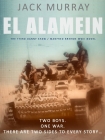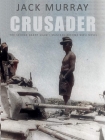El Alamein by Jack Murray (spanish books to read .TXT) 📗

- Author: Jack Murray
Book online «El Alamein by Jack Murray (spanish books to read .TXT) 📗». Author Jack Murray
The head of regiment, Lieutenant-Colonel Hans Cramer, appeared in front of the group. Red, inflamed eyes on a bloodless face gazed down at men as exhausted as he was.
‘It’s nearly midnight. We should announce the award,’ said Cramer.
His voice was stronger than he looked. Vertical lines were carved like canyons into his cheeks and on his forehead. He’d never fully recovered from his wounds of the summer and it showed. Yet his presence was appreciated deeply. There was an impalpable force within Cramer that lifted them all
They sat in mute exhaustion, unable to respond. Then, one by one, each of the senior officers rose. First Kummel, then the others raised their heavy bones; every man creaking like a wooden door with rusted hinges. How could the act of walking be so difficult, thought Kummel? Moving one step after another was its own triumph of will. He, and the other officers, walked along the centre of the leaguer. They nodded to the men they passed. All were sitting around campfires by their tanks. Some nodded back. Most were too exhausted to speak. Others had already fallen asleep, uninterested in waiting until midnight to bring in 1942. There was no shame in this. They were all at the edge of a precipice.
One by one the groups rose wearily to their feet as the officers passed. Kummel, Cramer and the other captains walked the full length of the leaguer and back again. The men began to follow behind Cramer and the other company commanders.
‘What’s happening?’ asked Manfred to Gerhardt. They were sitting near Gerhardt’s tank which was part of the 2nd Battalion of Regiment 8.
Gerhardt looked at the unshaven, hollow-eyed face of his friend and shrugged wearily. They rose slowly to their feet and started to follow behind the other men. They weren’t sure where they were headed. It hardly seemed to matter. Finally, Manfred spotted Colonel Cramer. He nudged Gerhardt and pointed towards him.
‘Not another bloody attack,’ commented Gerhardt. The thought of this gave him the energy to be angry. What was left of the tank regiment was a mockery of what they had been only a month previously. Damaged tanks, damaged men. All numbed by physical and mental fatigue. Few, if any, were in a fit state to fight.
They, and dozens of other tank men, finally reached the colonel. Cramer stood erect, feet shoulder width apart. At that moment it seemed like a caricature of military discipline. Everyone knew he was as exhausted as they were. He began to speak.
‘We have heard our Fuhrer speak. We know what is demanded of us. We know what is at stake. Victory in this war will only be achieved if we can take Cyrenaica back and then Egypt. This year has been hard for all of us. We have come close to victory, but we have also lost friends and comrades. None braver nor dearer to us than Major Gunther Fenski. I received news earlier this week that Major Fenski has been awarded the highest honour that can be bestowed upon a soldier, the Knights Cross. He is the third member of our regiment to be so honoured. He receives this for the bravery of his actions, and sacrifice, on 23rd November 1941. We give thanks that we had such a man amongst us. A man who led us, who inspired us and whose memory this nation will cherish as long as soldiers gather together to remember those who have fallen.’
Cramer stopped for a moment and gazed out at the sea of exhaustion that faced him His heart bled for the courage of his friend and comrade who had died and for those in front of him who had given so much. He nodded to the men and then turned towards the senior officers. The speech, if that’s what it was, had finished. There was only an odd silence. Applause seemed inappropriate. Then, from somewhere in the ranks a voice began to sing.
Manfred and Gerhardt turned around but could not see who was singing but the words cut through the cold night air like an electrical current. Soon other voices joined the lone singer. And then the two boys began to sing. Nervously at first and then, quickly, it became full throated like the cry of a wounded animal.
Deutschland, Deutschland über alles,
Über alles in der Welt,
Wenn es stets zu Schutz und Trutze
Brüderlich zusammenhält.
Von der Maas bis an die Memel,
Von der Etsch bis an den Belt,
2
Wadi Faregh, south of Agedabia, Libya: 21st January 1941
Manfred finished shaving and wiped his face with a dirty damp towel. It was five thirty in the morning. Despite the early hour, he felt curiously rested. A break of a couple for weeks from the fighting had been enough to recharge his energies. A couple of days in Tripoli had helped too. Upon his return he’d been assigned to a new tank in order to make way for the reinforcements to the regiment.
He drained the rest of his coffee and cleared up just in time to see his new commander come round the corner of the tank. He stood up immediately. Alongside him the other members of the tank crew also rose.
Hans Kummel nodded to Manfred and the others.
‘Any coffee left?’ asked the commander of the 1st Battalion. Kummel had been put in temporary command of the battalion following the death of Major Fenski the previous month. There was no better man to lead them, thought Manfred. That said, there was no worse one to be in the tank with. This was not a comment on his leadership. He was rightly adored by the men. However, ‘the Lion of Capuzzo’ had a nasty habit, observed Gerhardt drily one day, of always being at the head of a charge.
‘He’s suicidal,’ said Gerhardt. ‘Or mad.’
‘Maybe he thinks death is inevitable and he just wants to get on with it,’ suggested Manfred.
The conversation with Gerhardt had occurred a week previously





Comments (0)